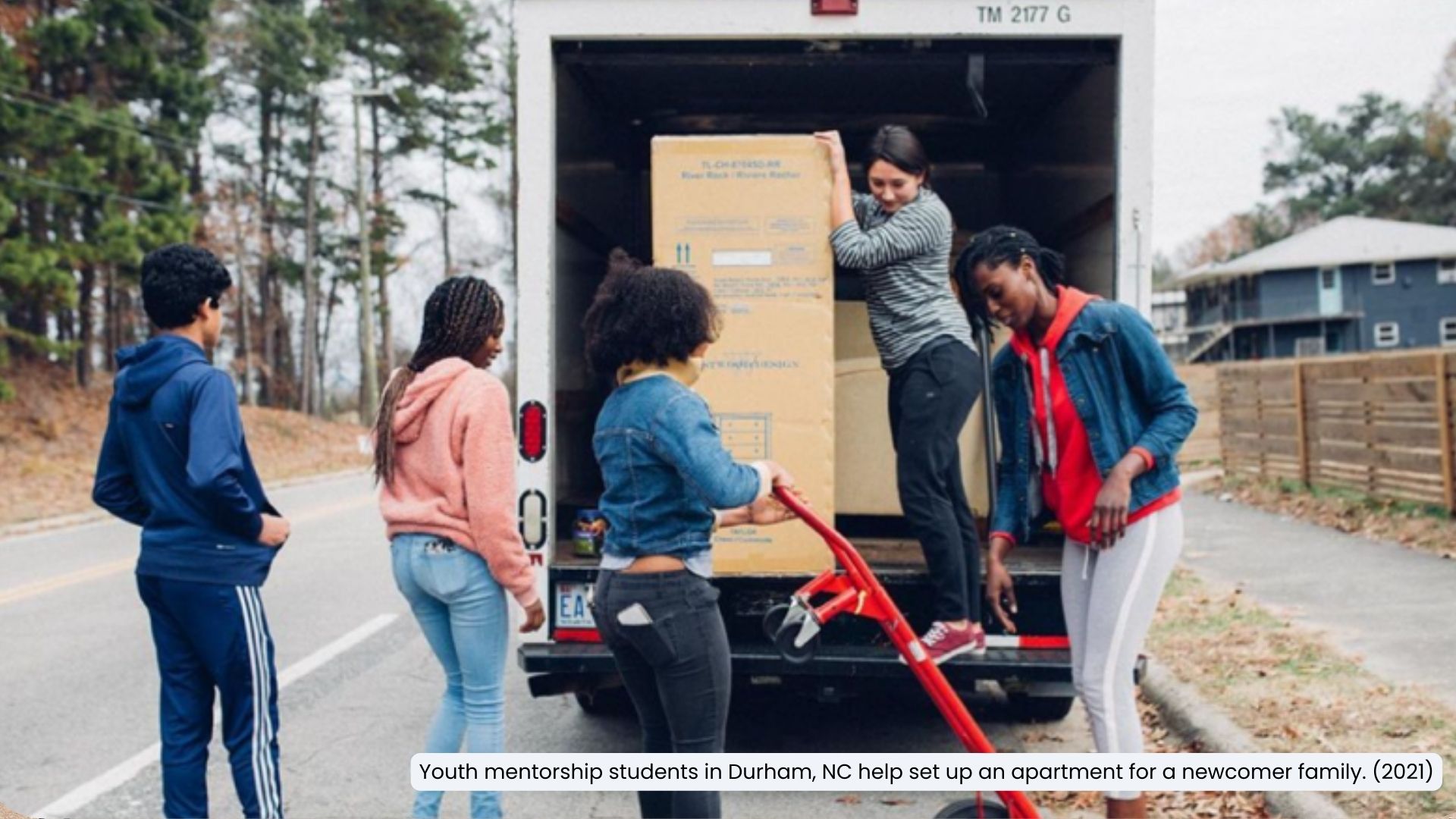While there is no one-size-fits-all approach on how to best support mentors of newcomer youth, program coordinators can tailor their management strategies to meet clients’ specific needs and provide strong support to volunteer mentors. Below, Selina Máté describes some of the challenges and common questions that many teams face while building a youth mentorship program for newcomers and offers potential solutions. Before she joined Switchboard, Selina worked for World Relief Durham, where she implemented their Youth Mentorship Program, funded by a Refugee Youth Mentoring grant from the Office of Refugee Resettlement.
In July 2019, I began my first role in refugee resettlement at World Relief Durham to implement their new Youth Mentorship Program. The funding opportunity we received from the Office of Refugee Resettlement (ORR) aimed to equip 15- to 24-year-old newcomers with educational and vocational development through mentorship.
As one of the initial ORR Refugee Youth Mentoring (RYM) grant recipients, our team encountered a steep learning curve and various challenges. In addressing those challenges, we gained valuable insights and knowledge that we can now share with other programs to help ensure their success, particularly in engaging community mentors with newcomer youth.
One of the first tasks I dove into was finding volunteer mentors. I began telling fellow agencies, schools, and local businesses about our call for mentors and asked if they would spread the word. Applications started coming in quickly. I was thrilled that community members were so eager to support our clients. But getting the community on board was just the beginning of a very complex engagement. I was determined to provide support to these mentors in order to create a safe space for mentorship relationships to flourish.
Through my work with mentors in our program, I developed a deep understanding of the challenges they faced in establishing meaningful relationships with their mentees. In this blog post, I will share these challenges and discuss how our team navigated them to support both
mentors and mentees.
Time and Logistical Issues
Newcomer youth may find themselves with high levels of responsibility and activity in their lives. In addition to staying on top of their education, their family may expect them to hold jobs to contribute to the family’s economic well-being and provide help at home through child care support and chores. Mentors may have difficulty finding time to connect with mentees, especially if the mentee is reliant on public transportation. Consider the sample scenarios below that your volunteer mentors may experience navigating these issues of time and other logistics.
Find ways to plug into already scheduled parts of their life. If your mentee is responsible for helping with cooking, ask if you can help them prepare a meal, expressing interest in learning what kinds of dishes they prepare from their home culture. Mentors can be helpful in assisting with chores, helping with their mentee’s siblings, or providing homework help. If a mentee has a job where a mentor can visit easily, drop by even just to say hello. If finding ways to be in physical proximity still proves difficult, see if you can schedule a weekly phone call or video chat to check in with each other.
Consider doing activities in their home or neighborhood, or help them get their learner’s permit or driver’s license. You can also check with your mentorship program for transportation assistance options, such as public transportation or rideshare programs. Additionally, research local programs that offer discounted or free public transportation passes for youth.
When your mentee is consistently late to your meetings, it can be a frustrating experience. It is important to not take this personally but instead reflect with cultural awareness on the different values that people from other cultures may hold regarding punctuality. This is also a chance for you to mentor your mentee in time management and communication. You can communicate with your mentee that you would like them to be on time for your meetings, and use this as a lesson for acculturation practice. If the issue persists, let your program coordinator know so they can investigate the situation and help find a solution.
Navigating Barriers
Many newcomers arrive in the U.S. with barriers to integration. Young newcomers often feel the pressure of maintaining their cultural traditions while quickly acclimating to their new environment. Ideally, resettlement agency staff can prioritize matching mentees with mentors who share a cultural and/or linguistic background, but this depends on who the available volunteers are. Consider the following scenarios to support mentors who are navigating cultural and language barriers.
RYM program staff should prioritize matching mentors and mentees who share a language, particularly for newly arrived newcomer youth. If that is not possible, mentors can apply the following strategies. Consider using your time together for language exchange to help your mentee improve their English skills. For simple exchanges, you can take advantage of interpretation technology. Additionally, you can play games or sports that do not require advanced levels of English. Finally, you can try watching movies in English with subtitles in the mentee’s home language.
Share your own experiences and ideas for how they can build relationships, citing examples from your own mentor-mentee relationships as practice. You can use this as a way to role-play with your mentee as they approach making other new friends. Mentors can also reach out to RYM program coordinators to identify existing relationships with schools and staff while exploring the possibility of cultural orientation at the school level. Finally, consider connecting with other mentors in your program to do group activities, as this can help your mentee build a community and connect with other program participants who have shared experiences.
If your mentee’s family is reaching out to you for assistance outside of your mentorship role, it is important to set boundaries while still being empathetic. They may understandably have questions as they adjust to their new life in the U.S., but you should prioritize your role as a mentor to their child. Express empathy for their situation and create a separate space with your mentee for conversation about their family responsibilities. If you feel uncomfortable with the family’s request, it may be best to refer them to their caseworker through your program coordinator.
Consider talking to the mentee’s parents and program coordinator about the possibility of involving the younger sibling in certain activities or finding other programs within the agency for them to participate in. While you want to support your mentee and they do have family responsibilities, it is important to prioritize your direct relationship with your mentee.
Engaging Families
Successful work with youth and young adults, especially those under the age of 18, requires buy-in from caregivers. However, some newcomer adults may struggle to understand the benefits of their children participating in programs like RYM. Caregivers want the best possible outcomes for their children but may have different ideas on how to help their children succeed in life. Consider the following scenarios and possible responses when navigating situations where mentees’ families have concerns about their children’s participation in your program.
One way to support the family’s understanding of your role as a mentor is to spend time getting to know the family early on. You can explain the benefits of program activities to their child’s future by framing your involvement as enrichment. Additionally, you can ask agency staff for help in sharing the importance of civic and social engagement for academic and vocational opportunities.
Remain supportive of your mentee without taking sides. Encourage empathy and understanding between your mentee and their parents, and share information and resources that may incorporate aspects of both your mentee’s and their parents’ goals. This could help bridge the gap between them and potentially find a solution that works for everyone involved.
If your mentee is hesitant to talk to their parents about seeking mental healthcare, it is important to involve your program coordinator, who can help navigate the conversation. They may also be able to provide counseling programs affiliated with the agency. You can offer a safe space for your mentee to talk about their concerns and suggest alternative routes to caring for mental health, such as journaling, exercise, or creative arts.
Identifying Meaningful and Affordable Activities
Since many of the newcomer youth in RYM programs come from recently arrived families with high financial need, they may have limited resources for engaging in activities outside of school and work. Additionally, mentors may struggle to find activities that are culturally appropriate, aligned with the interests of their mentees, and accessible given these financial concerns. Consider the common challenges outlined below with solutions to explore on supporting mentors in their activity planning.
When working with a mentee who only comes to you for help with tasks, reflect on your expectations and remember to keep a client-centered approach that prioritizes the needs of your mentee. Seek out meaning and bonding opportunities within the activities your mentee asks for. Be mindful that newcomer youth may have many responsibilities and may not prioritize “fun activities.” You can also reach out to other mentors to find a sense of community.
When your mentee expresses a desire to try new things that are expensive, you can talk to your program coordinator to see if there are any options for reimbursement, as they may have a small budget for mentors. If there is enough interest from other mentees, these opportunities could also become group activities. Additionally, you can suggest free or low-cost alternatives such as visiting museums, touring college campuses, or exploring local parks. There are many ways to explore your city without breaking the bank!
Program coordinators should validate the mentor’s concerns and assure them that intergenerational connections can provide a great deal of value for a young person. Mentors should start by finding common interests that both they and their mentees can bond over. Take the time to listen actively to your mentee: Ask questions and be curious about their experiences, and avoid making assumptions about what they like or what they’re interested in. Remember that patience is key, and building trust takes time. Don’t be afraid to seek guidance from program staff if you need additional support.
Don’t take their lack of interest personally, as newcomers experiencing integration stress may find trying new things to be especially difficult. Ask them what they would like to spend their time doing, and outline clear expectations for their participation in the program. Reach out to other mentors for suggestions, and if your mentee is still not participating, talk to your program coordinator about possible interventions to encourage them.
Meeting the Specific Needs of Your Community
Implementing a successful mentorship program for newcomer youth requires attention to various aspects, and no two programs will be the same. It’s crucial to understand the specific needs of the newcomer youth in your community and develop corresponding support and resources for the mentors who support them. In any program, program coordinators, caseworkers, and mentors should prioritize communication, support from families, and engagement in meaningful activities to create a positive impact. Although challenges are inevitable, maintaining an open mind and caring approach can lead to a fruitful and fulfilling mentor-mentee relationship.
If you are building a youth mentorship program and are interested in receiving technical assistance from the Switchboard team, please complete our TA request form.








